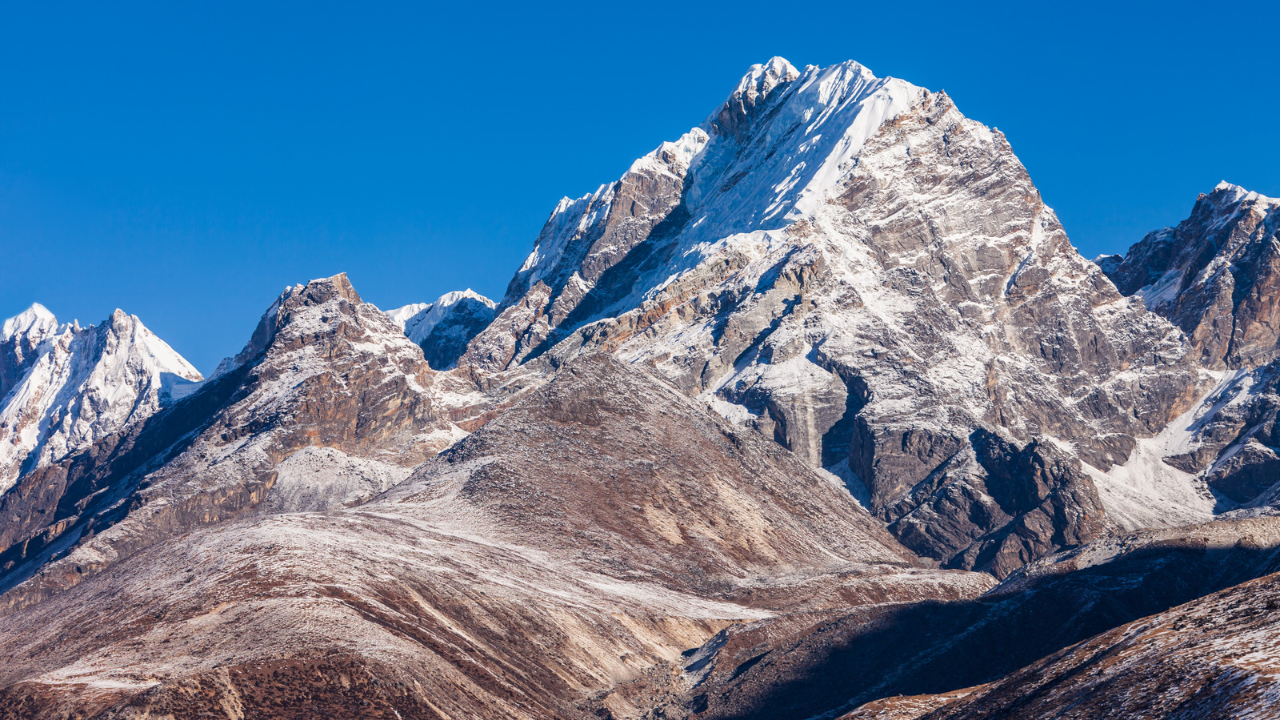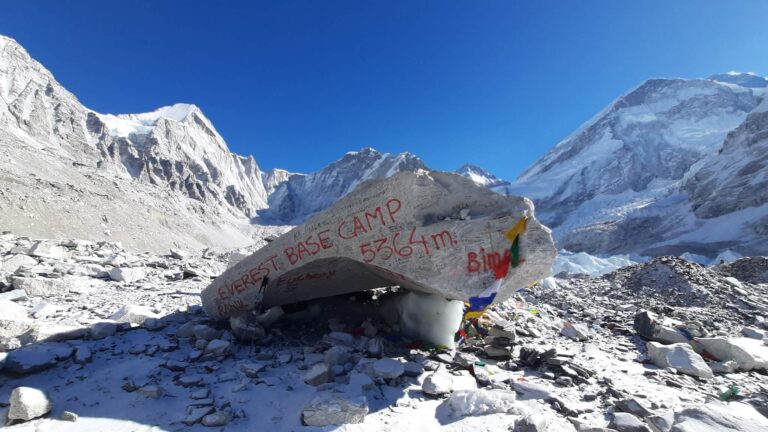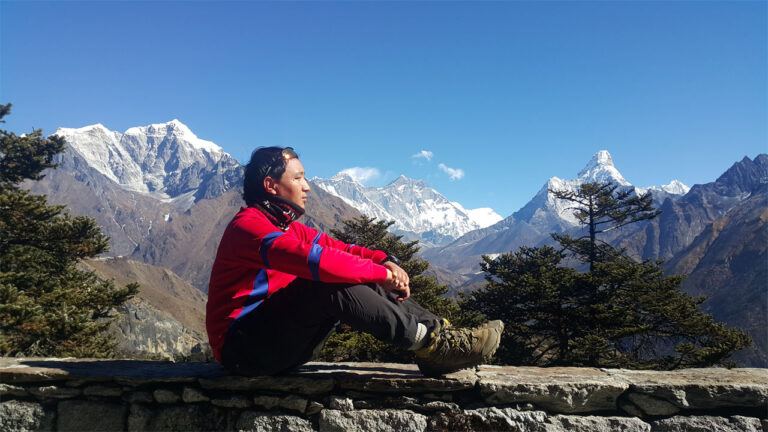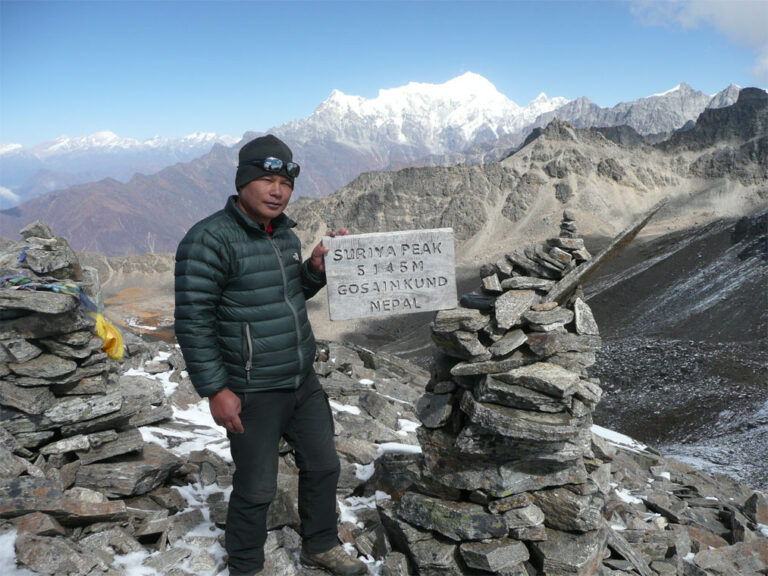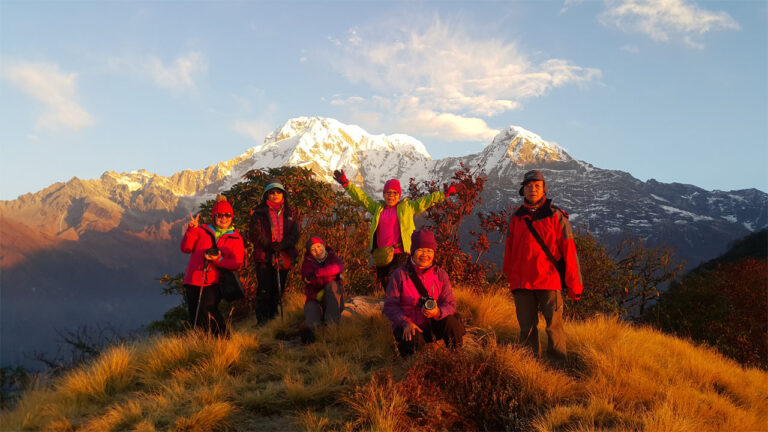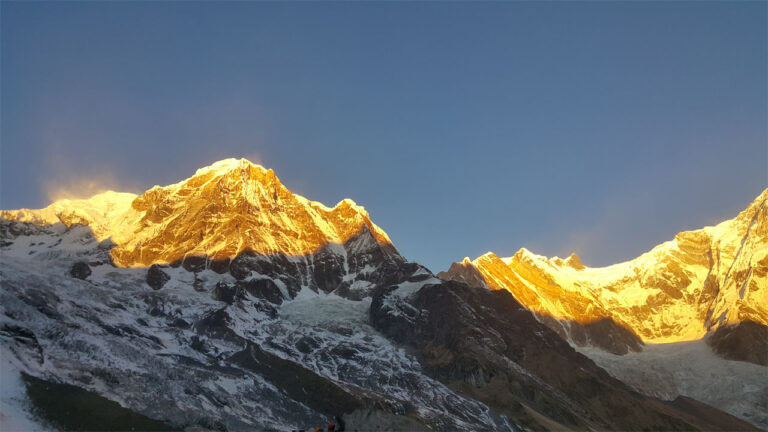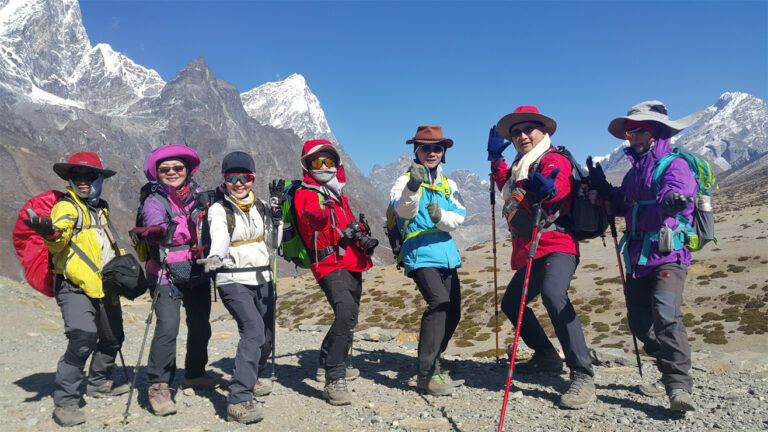3 Peaks Climbing (Island, Pokalde & Lobuche Peak)
The 3 Peaks (Island Peak, Pokalde Peak, and Lobuche Peak) in the Everest region of Nepal offers an exhilarating Climbing adventure combining stunning landscapes, challenging climbs, and cultural experiences. This journey typically spans around 20 days, starting with a flight into Lukla and a trek through the vibrant villages of Namche Bazaar, Tengboche, and Dingboche, where trekkers acclimatize while enjoying panoramic views of Everest and neighboring peaks.
Highlights
Three Peaks
- Climb three most famous peak in the Everest region 1:1 guide to client ratio on summit days Climb Island, Pokalde and Lobuche Peak Acclimatization trek to Gokyo and Cho la pass.
- Khumbu 3 Peaks Climbing is a unique Himalayan mountaineering holiday in the Everest region offering you a chance to climb three peaks in a single itinerary. Climb Island Peak [6,189m/20,305ft], Pokalde Peak [5,806m/19,049ft] and Lobuche Peak [6,119m/20,075ft] in a single trip with an acclimatization trek to Gokyo, Gokyo Ri and Cho La Pass.
- Our Khumbu 3 peaks climbing is suitable for people with and without previous experience of high altitude trekking and is looking for an ultimate climbing holiday in the Himalayas. The ascent of three peaks around 6000m in Khumbu region with a side excursion to Gokyo Lakes makes this trip unique.
- Trek to Gokyo and Chola Pass for acclimatization and climb the three major trekking peaks in the Himalayas.
- Learn mountaineering skills and build your experience of Himalayan climb. Or, if your goal is to climb bigger mountains like Ama Dablam, Manaslu or Cho You then this trip serves as an excellent preliminary trip.
Island Peak
- Climbing Island Peak Climb (6,189m/20,305ft) one of the 3 Peaks Climbing Grade: Alpine PD with 45 Degree snow slopes and exposed ridge climbing.
- Island Peak is one of the easiest 6000-meter trekking peaks. So, this is the perfect climbing peak for beginners. The route is not technical but climbing the steep section and tapered summit ridge demands better physical strength.
Pokalde Peak
- Climbing Pokalde Climb (5,806m/19,049ft) one of the 3 Peaks Grade: Alpine F Mixed ground with some easy rock scrambling.
- Climbing Pokalde does not require special technical skills but you will need strong stamina to conquer steep rocks to the summit. Passing via Khongma La Pass, we will attempt Pokalde Climbing through the north ridge. We may need to use fixed ropes at a few points. The summit offers views of Island Peak, Ama Dablam Mountain and other peaks and mountains.
Lobuche East Peak
- Climbing Lobuche East Climb (6,119m/20,075ft) one of the 3 Peaks Grade: Alpine PD with 45 Degree snow slopes and exposed ridge climbing.
- Lobuche is the toughest peak to climb among these three. Lobuche climbing route is relatively easy up to far eastern summit afterwards which it offers challenges of climbing an unstable ridge. The summit offers spectacular views of Khumbu valley with Everest, Pumori, Ama Dablam and other peaks and mountains.
Why climb with us?
At Everest Expeditions Nepal we always believe in ‘Safety first and Service paramount’. The success of any climb depends largely on a carefully planned itinerary and best logistics and these are what we offer. We are committed to maintaining the climb safe and success with the quality of service. Our emphasis is always on maintaining the small group so that it will be easy to coordinate and cooperate with each other. You will be guided by highly professional guides who have experience of successfully climbing several national and international peaks. At Everest Expeditions Nepal, we provide 1:3 guide to client ratio on summit days.
We are dedicated to providing the highest professionalism throughout the climb by taking utmost care of all the logistics needed
Is this trip for you?
This 3 Peaks Climbing trip is considered challenging due to longer duration trek/climb reaching up to an elevation of 6000m. You need to sleep at an elevation of 5000m+ for few days. Physically strenuous, involving daily trekking of approximately 6 – 8 hours and the summit days will be 10-12 hrs. Previous experience of climbing is beneficial but it is not mandatory to take part. You should be moderately fit and must enjoy walking and adaptable to high altitude conditions.
Previous experience of trekking at high altitude will be beneficial and you will need a very strong physical stamina level. This grade trip involves usages of climbing equipment (Harness, Crampons, Mountaineering Boots, Ascender). Previous experience is essential and we also provide a climbing course at base camp before the actual climb where your guides will teach you the skills required for the climb.
Important Note: Your safety is of imperative concern while travelling with Everest Expeditions Nepal. Please take care to note that your leader/guide has the authority to amend or cancel any part of the itinerary if it is deemed necessary due to your safety concerns. Every effort will be made to keep to the above itinerary; however, since this adventure entails travelling in remote mountainous regions, we cannot guarantee that we will not deviate from it. Weather, health condition of a group member, unexpected natural disasters, etc., can all contribute to changes in the itinerary. The Trek & Climb leader/guide will try to ensure that the trip runs according to plan, but please be prepared to be flexible if required.
Trip Itinerary
DAY01 – Arrival in Kathmandu [1,350m/4,430ft]
Arrival at Tribhuvan International Airport, Nepal. Upon completing the visa formalities and collecting your luggages in the airport, kindly proceed to the exit of the arrival hall. Your trip leader will await you just outside the arrival hall and will escort you to your hotel in Kathmandu. Please look out for a placard of Everest Expeditions Nepal .Meal: Dinner
Accommodation: Hotel
Trekking Hours: 0
DAY02 – Exploration of Kathmandu and trek/climb preparation [1,350m/4,430ft]
After your first night in Kathmandu, you will be well informed on arrival about the time for your exploration tour in Kathmandu, which includes Bouddhanath stupa and Pashupatinath temple. However, sometimes, depending on your flight arrival, if it’s too late into the night we will do this tour in the afternoon instead of morning to give you some sleep and rest so that you can get rid of that jetlag before you venture out of the Hotel for our interesting tour. In the evening, you will be briefed by your trek and climb leader about your trekking program the next day. In case you have fallen short of any trek and climb equipment that you may need, this time can be used to arrange for it.
Meal: B
Accommodation: Hotel
Trekking Hours: 0
Day03 – Fly to Lukla and trek to Phakding [2,600m/8,531ft]
Wake up early in the morning and leave from the hotel at approx 5 am to catch a flight to Lukla. Flight times are generally scheduled for early morning and the exact airport time will be announced a day earlier.
At Lukla, we are immediately overcome by the scale of the massive peaks that surround the village but this is only an indication of what is to come. After meeting the crew, we head up the Dudh Koshi Valley on a well-marked trail and then stay overnight in Phakding.
Overall elevation gain tonight from previous night: 1,250m/4,100ft
Meal: B, L, D
Accommodation: Teahouse / Lodge
Trekking Hours: 4-5
Day04 – Trek to Namche Bazar [3,450m/11,319ft]
We will move along Dudhkoshi River which will take us through pine forest. After crossing suspension bridges at several points and passing through small settlements of Zapute, Toktok, Benkar and Chumoa, we will reach Monjo. This is known as the gateway to the Sagarmatha National Park. At Monjo, our trek leader will deal with all necessary national park formalities and then we will enter Sagarmatha National Park. Lowering down from the park, we will arrive at the river. Crossing another suspension bridge, we will proceed towards high Hillary Bridge located at the foot of the hill. Crossing this bridge, we will climb uphill to the Namche Bazaar. We can get a view of Thamserku Mountain. If the weather is clear, we can also have the first view of Mt. Everest, Lhotse, Nuptse and Kusum Khangru mountains. We will stay overnight in a lodge in Namche Bazaar.
Meal: B, L, D
Accommodation: Teahouse / Lodge
Trekking Hours: 6 – 7
Day05 – Rest and acclimatization day [3,450m/11,319ft]
Namche Bazaar is regarded as a gateway to the high Himalayas. It is also the main trading centre and the capital of Sherpa land. Rest is recommended in Namche for acclimatization purpose. A short hike will be arranged to the ancient Sherpa village of Thame to observe the rich Sherpa culture or we can also visit nearby Khumjung, Khunde or Khongde villages. Shopping in the marketplace of Namche is another fine idea. National Park Head office, Museum and monasteries are other places of interest. The area is clustered with cafes, shops, bakeries and restaurants. The place supports facilities of the post office, hospital, government health post. Internet access is also available at Namche so that you can contact your near ones. Overnight stay in a lodge in Namche Bazaar.
Meal: B, L, D
Accommodation: Teahouse / Lodge
Trekking Hours: 4 – 5
Day06 – Trek to Dole [4,040m/13,255ft]
Today it’s a steep climb out of Namche Bazaar up to Kyangjuma Village. At Kyangjuma, we can contemplate on terrific views of Thamserku, Kantega, and Ama Dablam. The tough part of today is surely going to be the ascent of the Mong La, a very appealing place hanging on the spur of Mt. Khumbila. A medieval historical Chorten stands at the centre of the settlement of Mong La. We spend some time at the top of Mong La to look with awe at the surrounding snow-capped mountains and valleys while enjoying lunch. The most eye catching feature of the trail today is the wealth of plant and animal vegetation including wildflowers and Rhododendrons that we see on the way. We may even spot wild lives like pheasants, mountain goats, and the subtle musk deer. Continuing our hike through forests, some waterfalls and bridges, we reach Dole, a small village with few teahouses.
Overall elevation gain tonight from previous night: 590m/1,936ft
Meal: B, L, D
Accommodation: Teahouse / Lodge
Trekking Hours: 6-7
Day07 – Trek to Machhermo[4,470m/14,665ft]
Today it’s another short day starting with a climb out of the small Dole Valley before ascending more gradually up the Dudh Kosi valley, high above the river. The walking is easy, but we will still feel the effects of altitude on even the smallest hillock. The barren alpine scenery with only small clusters of scrub juniper is a stark contrast to the snowy white peaks and deep blue skies. After two hours, we will arrive at Luza (4360m), and after a further hour’s walk we reach our lodge at Machhermo (4465m) where you will spend the evening. After lunch there is an option to take an excursion across rocky moraines to the base of Kyajo Ri (6168m) and Machhermo Peak (6073m). However, keep an eye open for the Yeti! It was here, in 1974 that three yaks were killed and a Sherpa girl injured when trying to fight off a hairy, ape-like intruder that could have been a hungry grizzly bear!
Overall elevation gain tonight from previous night: 430m/1,411ft
Meal: B, L, D
Accommodation: Teahouse / Lodge
Trekking Hours: 4-5
Day08 – Rest and Acclimatization day [4,470m/14,665ft]
We are more or less nearing an altitude of 4500m, so we haul up at Machhermo for an extra day to acclimatize by getting our bodies used to the thin air as we climb up. There are plenty of outlets for exploration around the camp and just above the village, there is a gracious vista that encircles Cho Oyu at [8210m] and the mountains which flank the Ngozumpa Glacier.
Meal: B, L, D
Accommodation: Teahouse / Lodge
Trekking Hours: 3 – 4
Day09 – Trek to Gokyo [4,800m/15,750ft]
After breakfast, we climb through a crest Chorten from where we enjoy master views of the valley below and Mt. Kangtega, Thamserku, and the northern part of Cho-Oyu at (8153m). Beyond the ridge, the valley opens out as the trail passes through a Chorten and reaches Phangka at (4480m) after a brief soft hike. Phangka is an area where an avalanche in 1995 killed 40 people. We descend to the river bank before beginning to climb up to the terminal moraine of the Ngozumpa Glacier. It is a steep climb on the moraine. After crossing an iron bridge over a stream the trail levels out as it follows the valley past the first lake, known as Longpongo at 4690m, where we get chance to see the Lama footprints on a stone. As we see the sights of the second lake, Taboche Tsho, we watch in awe the glimmering turquoise blue mass of water dazzling in the sunshine. Just ahead of the second lake, we reach the third lake, the two connected by a heaving stream. Gokyo village is neatly placed by the third lake and Cho-Oyu Mountains stand tall in the backdrops, setting off stunning scenery, an ideal spot for our video cams to go on overdrive at this awesome area. After lunch, we discover more of the third Lake, Dudh Pokhari.
Overall elevation gain tonight from previous night: 330m/1,083ft
Meal: B, L, D
Accommodation: Teahouse / Lodge
Trekking Hours: 5-6
Day10 – Climb Gokyo Ri [5,357m/17,575ft] and trek to Thagnak [4,750m/15,584ft]
Morning climb to Gokyo Ri. Gokyo Ri is a major viewpoint in the Gokyo region and the view from the top is mesmerizing. We retrace to Gokyo for breakfast and we soon leave this zone with lifetime memories never to be forgotten. After relishing a warm breakfast, we trek down to Thagnak for overnight scaling by the second of the Lakes; the route across the glacier is identified by cairns and is pretty well determined. We climb off the glacier by a small dwelling known as Thagnak and follow a low valley to our camp by a small kharka.
Overall elevation gain tonight from previous night: -50m/-164ft
Meal: B, L, D
Accommodation: Teahouse/Lodge
Trekking Hours: 6-7
Day11 – Cross Chola pass [5,420m/17,783ft] and trek to Dzongla [4820m/15,814ft]
Cho La Pass is also another show up of this trip. The pass is not itself difficult but it is steep and involves a glacier traverse on the eastern side. We need to be careful as the trail is vertical and the rocks glazed by ice add trouble to the trekkers making the trail slippery. While trekking through the side of a frozen lake we reach the top of the pass decorated with prayer flags. The pyramidal Ama Dablam presides over a range of mountains on the south even as Cholatse soar on the west and Lobuche East and Baruntse rise sharply to our right. We need to pass through some crevasses before we reach Dzongla, another beautiful place with a complete view of Mt. Cholatse, Mt. Ama Dablam, Lobuche peak and the Pheriche village far below.
Overall elevation gain tonight from previous night: 70m/230ft
Meal: B, L, D
Accommodation: Teahouse/Lodge
Trekking Hours: 7-8
Day12 – Trek to Lobuche [4,950m/ 16,240ft]
From Dzongla, we will head towards Lobuche. After following the straight path for a couple of hours, we need to follow the steep rocky trail towards Lobuche Glacier. The path offers spectacular views of Ama Dablam, Cholatse, Thamserku, Kantega, Pokalde and other peaks.
Meal: B, L, D
Accommodation: Teahouse/Lodge
Trekking Hours: 5-6
Day13 – Rest day and Climbing Clinic
After breakfast, there will be a climbing clinic scheduled today. You will receive pre-climb training from your guide on this day. The skills required for the climb will be taught with the proper use of equipment and knowledge of the terrain.
Rest of the day is free to rest and recover.
Meal: (B,L,D)
Accommodation: Teahouse/Lodge
Day14 – Move to Lobuche High Camp [5,400m/17,712ft]
Leaving Lobuche Base Camp, we will move along rocky moraine path towards Lobuche High Camp. We will move through Lobuche glacier. We will climb through the rocky terrain to Lobuche High Camp.
Meal: B, L, D
Accommodation: Fully Tented Camping
Trekking Hours: 3 – 4
Day15 – Summit Lobuche [6,119m/20,075ft] and descend to Lobuche
We will wake up quite early this day as we aim to reach the Lobuche summit one of the 3 Peaks before noon. Then head out to the summit during predawn. We need to cross-ice slopes for which crampons and ice axe proves really useful. They may need to pass crevasses before climbing to the summit. The summit allows enticing views of Everest, Lhotse, Nuptse, Cholatse, Ama Dablam, Pumori and other mountains in the Everest region. After spending some quality time in the summit, we will lower down to Lobuche High Camp and then to Lobuche for our overnight.
Meal: B, L, D
Accommodation: Teahouse/Lodge
Trekking Hours: 10-12
Day16 – Contingency day
This is a free day which has been allocated in the itinerary to ensure that our schedule will go on smoothly without interruption even if there occur complications during climbing peaks. The successful adventure depends on multiple factors like weather condition and fitness of our fellow crew members. In such a case, the contingency day will be useful for sticking up to the plan.
Meal: B, L, D
Accommodation: Teahouse/Lodge
Day17 – Move to Pokalde High Camp [5,400m/17,717ft]
Leaving Pokalde Base Camp, we will move towards Kongma La Pass. The Pass offers views of the wide valley that is dotted with frozen lakes. We can also observe the panoramic view of Pokalde Peak including Cholatse peak, Nuptse Mountain, Lhotse Mountain, Makalu Mountain and Ama Dablam Mountain. Little further from Kongma La Pass is Pokalde High Camp where we will stay overnight.
Meal: B, L, D
Accommodation: Fully Tented Camping
Trekking Hours: 5-6
Day18 – Summit Poklade [5,806m/19,049ft] and descend to Chukung [4,730m/15,518ft]
We will climb to the summit of Pokalde Peak one of the 3 Peaks on this day. Waking up early in the morning, we will move along the rugged pass. Walking through the snow ridge, we need to cross a few rocky pinnacles. The journey continues through the ridge. From this point, the climbing is going to be a bit tough. We will reach to the narrow rocky pinnacle. Moving past boulders and snow, we will reach the summit. Pokalde Peak can be attempted from North, North East, North West or South Face. We will enjoy the spectacular views of Mountains in Everest region including Everest, Makalu, Ama Dablam, Pumori and then descend to Chukung.
Meal: B, L, D
Accommodation: Teahouse/Lodge
Trekking Hours: 10-12 hrs
Day19 – Rest day at Chukung [4,730m/15,518ft]
Rest day at Chukung to recover from our last two climbs.
Meal: B, L, D
Accommodation: Fully Tented Camping
Trekking Hours: 6 – 7
Day20 – Trek to Island Peak Base Camp [4,970m/16,300ft]
From Chukung, we will reach Island Peak Base Camp. Climbing south from Chukung, we will head east and proceed through Lhotse glacier through Imja and Lhotse glacier moraines to the southwest side of Island Peak where we will set our camp. The site offers scenic views of surrounding mountains and moraine valleys.
Meal: (B,L,D)
Accommodation: Fully Tented Camping
Trekking Hours: 3-4
Day21 – Summit Island Peak [6,189m/20,305ft] and back to Chukung
We will wake up much early on this day, leaving Base Camp at around 2 am. We will take moderate climb for the first part of the climb before reaching the steep hillside. The terrain frequently changes from sandy area to meadow to boulder. From the hill, we will follow the tapered path through a steep rock channel to emerge to the gully. Walking through a ridgeline, we conquer the challenges proposed by seracs and crevasses. We will proceed through the snout of the summit glacier with the help of ropes and move through 40- degree snow slopes to reach the summit.
The challenge of the climb is rewarded with the gratifying views of Lhotse Mountain, Nuptse Mountain, Makalu, Baruntse and Amadablam Mountains. We will capture the memories in the camera and then prepare ourselves for long descend to the Base Camp and trek to Chukung. We will celebrate the successful Island Peak one of the 3 Peaks climb of our first objective
Meal: B, L, D
Accommodation: Fully Tented Camping
Trekking Hours: 10-12
Day22 – Contingency day
Another contingency day
Meal: B, L, D
Accommodation: Teahouse / Lodge
Day23 – Trek to Pangboche [3,985m/13,075ft]
We will follow the easy descending trail from Lobuche Base Camp. The path from Lobuche to Pheriche is scenic with close-up view Ama Dablam Mountain. From Pheriche, we will move further to Pangboche through rhododendron and juniper forest.
Meal: B, L, D
Accommodation: Teahouse / Lodge
Trekking Hours: 6-7
Day24 – Trek to Namche Bazar [3,450m/11,319ft]
Leaving Pangboche early in the morning, we will follow the return trail along Imja River that takes us through the forest of birch and spruce to Tengboche village. After brief stop in Tengboche, we will follow the trail through forest of blooming rhododendron to the bridge. We will cross the bridge over Dudh Koshi River and move through Dudh Koshi gorge and pine forest to Sansa village. The region is rich in Himalayan wildlife like mountain goats, Thars and local birds. We will pass through the chorten to the army camp at Namche Bazaar.
Meal: B, L, D
Accommodation: Teahouse / Lodge
Trekking Hours: 6 – 7
Day25 – Trek to Lukla [2,800m/9187ft]
Our last day of trek following the Dudh Kosi River down to Lukla. It’s only a gradual walk along the Dudhkhosi river after our steep descent from Namche. We’ll have lunch on our way and we make the final climb up to the airstrip at Lukla. Rest of the day is free and you can relax under the warm sun & reflect on the emotional experiences we had while hiking through these massive mountains that have probably helped us re-discover ourselves in ways least expected. This is our final day on these fantastic mountains. Later we celebrate our successful completion of trek & climb with our Sherpa guides and porters who we’ve got to know so well & are now good friends. It’s a pleasure to end this wonderful trip on a happy note. We then slumber into blissful sleep.
Meal: B, L, D
Accommodation: Teahouse / Lodge
Trekking Hours: 6-7
Day26 – Fly to Kathmandu [1,350m/4,430ft]
We get up early in the morning, enjoy our b/fast & get ready for the arrival of our aircraft for the flight back to Kathmandu. On our touchdown at the Kathmandu airport, you will be transferred to your hotel. The rest of your day is free to do your own things.
Meal: B
Accommodation: Hotel
Trekking Hours: 0
Day 27 – Free day in Kathmandu [1,350m/4,430ft]
Enjoy a leisure day. You are on your own. Participating in a day tour in Kathmandu is a pleasant plan. You can also go for shopping in Thamel, a tourist hub where you can buy souvenir items like handicrafts and arts to your family. At eventide, we will relish a farewell dinner to celebrate our successful climb. While enjoying our supper, we will also be entertained to a scintillating cultural dance performed by the local belles
Please do not hesitate to let us know if you would like to extend your stay. Kindly email us for more details on extensions.
Meal: B
Accommodation: Hotel
Trekking Hours: 0
Day 28 – International departure
Finally, the undeniable day of departure arrives. Thank you for joining us on this climb and it has been a pleasure getting to know you during this time. We hope this venture has enriched your experience with happy memories. You will be assisted in your last-minute preparation. Our representative will take you to Tribhuvan International Airport three hours before your scheduled flight. Keep in touch and hope to hear from you soon. Bon voyage for a safe and pleasant trip home.
Meal: B
Accommodation: None
Trekking Hours:
Dates & Price
Our 3 Peaks Climbing trips are available on both fixed departure and private group basis.
If you are looking for a group to join this 3 Peaks Climbing trip please click the Fixed Departures tab for more information on departure dates, availability and price. All our fixed departures are guaranteed to run. Or, if you would like to do this 3 Peaks trip alone, or with your friends, families & colleagues in a private group style please fill out the contact form in Private Group tab and send us your message. We will organize a private trip for you at your preferred dates catering any request you may have.
Trip Cost Includes
Everest Expeditions Nepal has a philosophy with 3 Peaks Climbing trip inclusions: as much as possible expenses is included so that customers know the total cost of the adventure trip up front
1. Airport Pick-up and Drop Off,
2. Licensed and trained trekking guides,
3. potters for carrying goods and supplies,
4. Meal on full board (breakfast, lunch, dinner, tea & coffee) basis during the trek
5. 4 Nights Accommodation in the 3 Star Hotel in Kathmandu with B & B. (Bed
& Breakfast)
6. All accommodation during the trek.
7. All meals and hot beverages during the trek.
8. Transportation to and from trail head by Private Transport.
9. All necessary documents and permits for trekking (where applicable)
10. National Park/Conservation Area entry Permit, Insurance, and equipment for the staffs.
11. Coordination of quick Rescue service (Costs covered by your Insurance Plan)
12. Trekking staffs wages etc.
13. 1 hr. trekker massage after your trek.
14. Welcome and Fare well dinner in a Nepali Cultural Dance restaurant in Kathmandu.
15. Domestic Flight Ticket from Kathmandu to Lukla to Kathmandu.
16. Trekking Staff Insurance of $10,000 Per Person. and Climbing Sherpa Insurance of $19,000 Per Person.
17. 3 Peaks Trekking Map, T-shirt, and Trekking certificate, Climbing Certificate,
18. Exclusive of Medical Kit Bag
19. All Government and local Taxes
20. International Flight ticket re-confirmation.
21. Meals will be Start when your Trek starts.
Services and Cost Does not Included in Price:
1. International Airfares,
2. Travel/Trekking Insurance,
3. Excess baggage charges More than 16kg and hand bag more than 5 kg in
domestic flights.
4. Visa fees.
5. Airport Departure Taxes.
6. Drinks (Cold and Alcoholic) Rescue charge.
7. Tips for The staffs.
8. Expenses of Personnel nature and Permit and Liaison officer fee (where Applicable.
9. Meals during stay in the Kathmandu
10. Extra Domestic Ticket Etc.
11. Extra Hotel in Kathmandu or other Destination.
Travel Insurance
It is a condition of joining any of our 3 Peaks trips that be protected against comprehensive expenses potential to incur due to medical issues or accidents (to include air ambulance, helicopter rescue, and treatment costs). Please be noted that we don’t arrange or sell insurance.
Porter Care:
Though often overlooked, it’s no exaggeration to say the entire trekking and expedition industry in Nepal is built on the back of hard working local porters. It is their tireless efforts carrying supplies, equipment and baggage that make journeying to these remote areas possible. So it’s very unfortunate that they have endured a history of exploitation and abuse at the hands of the industry. In an effort to combat this, we are firmly committed to porter rights. We ensure all our porters are well treated, well paid and we provide the level of shelter, clothing and footwear that these harsh environments demand.
Porters who become sick during 3 peaks Climbing are treated with the same care and attention as other team members and we have previously used helicopters – at our expense – to rescue porters from dangerous situations. We support the work of the International Porter Protection Group (IPPG), making our resources available to them to help improve the working conditions of the porters. (International Porters Progress Group)
Best Time for Island Peak Climbing | Lobuche Peak Climbing | Pokolde Peak
The best months for this 3 Peaks Climbing are Spring (Mid March to May) and Autumn (mid September to November) although this 3 peaks can be climbed during the months of December, January and February
NOTE: During the 3 Peaks trip; weather, local politics, transport or a multitude of other factors that are beyond our control can result in a change of itinerary. It is, however, very unlikely that the itinerary would be substantially altered; if alterations are necessary the leader will decide what is the best alternative, taking into consideration the best interests of the whole group. Where a change does occur, we do everything we can to minimize its effect, but we cannot be responsible for the results of changes or delays.
Flight Delay in LUKLA
Twin Otter is the primary mode of transport from the airstrip at Lukla. This service is fairly dependable. Sometimes, flights may be cancelled due to mountain weather conditions or other technical problems. In such case, Everest Expeditions Nepal will organize the alternative available road transportation or Helicopter Flight to ensure you are on schedule for your international flight. In case if you want to Flight through Helicopter then you need to Add some amount on the same cost of the Ticket of Kathmandu to Lukla.
What makes this trip different?
Everest Expeditions Nepal works closely with and is one of the main supporters of Friendship Society Nepal, a non-political and non-profit social organization. We contribute our support to the remote village of Lura, Gorakhani, Juke, Dharapani, Loading (Solukhumbhu, Nepal) through donation, sponsorship and partnership in various projects.
Donation
Everest Expeditions Nepal donates a 10% percentage of business profits to the foundation on a yearly basis, which supports the ongoing maintenance cost required for Shree Manjushree Primary school, Note Books / Copies for the Schools a community-based school in Lura Solukhumbhu (plus few other schools in the region).
Sponsorship
One of the major activities of Friendship Society Nepal is the children sponsorship program, which is conducted with full collaboration with Everest Expeditions Nepal.
Partnership (Volunteering Program)
The Solukhumbhu Volunteer Program, devised by Everest Expeditions Nepal and Friendship Society Nepal, aims to mobilize teams of experts and interested individuals as an effective and economic measure in providing the human capital for education, health and community development in Lura village of Solukhumbhu district, western Nepal.
For more details, visit Friendship Society Nepal’s website www.friendshipsocietynepal.org
This is all for today and if you have any questions Please feel free to ask us at any time.
Thank you!
Best Regards!
Nima Dorjee Tamang

